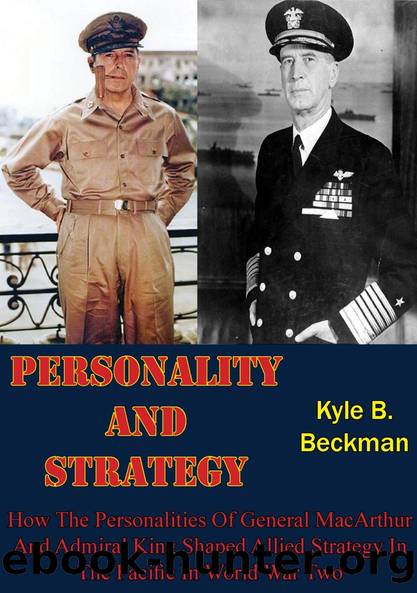Personality And Strategy: by Kyle B. Beckman

Author:Kyle B. Beckman [Beckman, Kyle B.]
Language: eng
Format: epub
Tags: History, Military, United States, Europe, General, Germany, Asia, Japan
ISBN: 9781786254030
Google: bTNwCwAAQBAJ
Publisher: Pickle Partners Publishing
Published: 2015-11-06T05:08:12+00:00
CHAPTER 4âFINDINGS: IMPACT
Having demonstrated that both General MacArthur and Admiral King possessed the three components of a dominant personalityâconfidence, persistence, and competenceâin abundance, this thesis will examine how three key strategic decisions in the Pacific War were effected by one or both of these dominant. The first was the choice to begin limited offensive operations with available assets beginning in February 1942. The second key decision was the initiation of offensive amphibious operations with the invasion of Guadalcanal in August 1942. The final key decision was the struggle that raged through much of the war regarding the relative priority of the Allied drives across the Central and Southwestern Pacific which culminated with the Luzon versus Formosa debate.
MacArthur and King played distinctly different roles in each case; thus, their personalities affected each decision quite differently. In the first case King and his staff drove the decision-making process with little input or interference from MacArthur or Army planners in Washington. It was therefore essentially a case of a dominant personality operating unopposed. With regard to the invasion of Guadalcanal, both MacArthur and King were working toward the same objective, the capture of the major Japanese base at Rabaul, but each wished to achieve the objective in their own fashion. This was a case of two dominant personalities working in competition toward the same objective. Regarding the liberation of the Philippines, MacArthur was an unwavering, almost fanatical, advocate of this course of action from the moment he left Corregidor. King, on the other hand, opposed the islands as a primary objective from the beginning, and remained steadfast in his opposition long after all other key decision-makers had been convinced of the desirability of invading Luzon. Therefore, this case serves to illustrate the effects of two dominant personalities pursuing diametrically opposed courses of action.
In addition to reflecting the personalities of MacArthur and King each of these decisions is worth examining for at least two other reasons. First of all, none of the three was a trivial choice easily arrived upon. In the case of the Luzon invasion, the difficulty in reaching consensus clearly highlights the challenging environment in which the decision was made. However, the obstacles facing the other two decisions are not so obvious, particularly in hindsight. These challenges will be discussed in greater detail below. In summary the early carrier raids and the Guadalcanal invasion were both executed by gambling scarce assets at times when agreed-upon Allied grand strategy probably indicated that each was premature.
The second reason these decisions are of continuing interest is their significant impact on the course of the war. Again, this is more apparent in the third case and less obvious in the other two. Nevertheless, the evidence strongly suggests that the early carrier raids had strategic impact far beyond their rather meager tactical results. In the case of Guadalcanal, the island could likely have been invaded or bypassed at a later date when sufficient forces had been built up in the theater. However, the threat that strong
Download
This site does not store any files on its server. We only index and link to content provided by other sites. Please contact the content providers to delete copyright contents if any and email us, we'll remove relevant links or contents immediately.
| Central Asia | Southeast Asia |
| China | Hong Kong |
| India | Japan |
| Korea | Pakistan |
| Philippines | Russia |
The Sympathizer by Viet Thanh Nguyen(4382)
The Rape of Nanking by Iris Chang(4194)
World without end by Ken Follett(3470)
Ants Among Elephants by Sujatha Gidla(3458)
Blood and Sand by Alex Von Tunzelmann(3186)
Japanese Design by Patricia J. Graham(3163)
The Queen of Nothing by Holly Black(2577)
City of Djinns: a year in Delhi by William Dalrymple(2543)
Foreign Devils on the Silk Road: The Search for the Lost Treasures of Central Asia by Peter Hopkirk(2454)
India's Ancient Past by R.S. Sharma(2447)
Inglorious Empire by Shashi Tharoor(2428)
Tokyo by Rob Goss(2423)
In Order to Live: A North Korean Girl's Journey to Freedom by Yeonmi Park(2373)
Tokyo Geek's Guide: Manga, Anime, Gaming, Cosplay, Toys, Idols & More - The Ultimate Guide to Japan's Otaku Culture by Simone Gianni(2357)
India's biggest cover-up by Dhar Anuj(2343)
The Great Game: On Secret Service in High Asia by Peter Hopkirk(2327)
Goodbye Madame Butterfly(2243)
Batik by Rudolf Smend(2173)
Living Silence in Burma by Christina Fink(2058)
